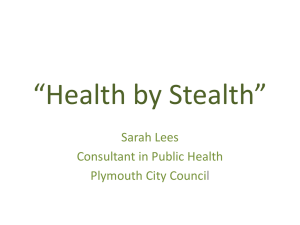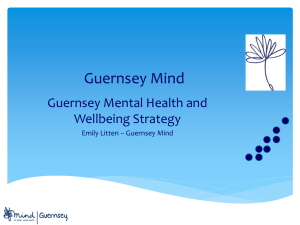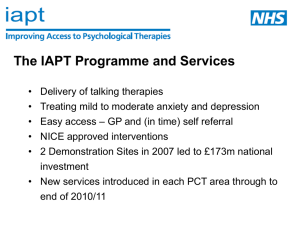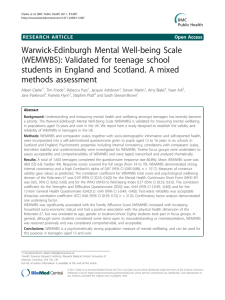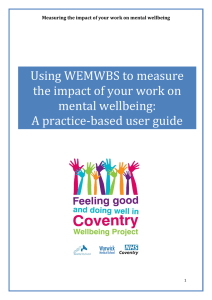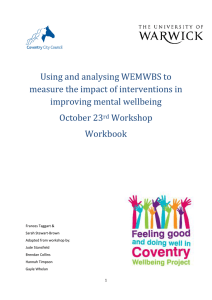Professor Sarah Stewart-Brown
advertisement
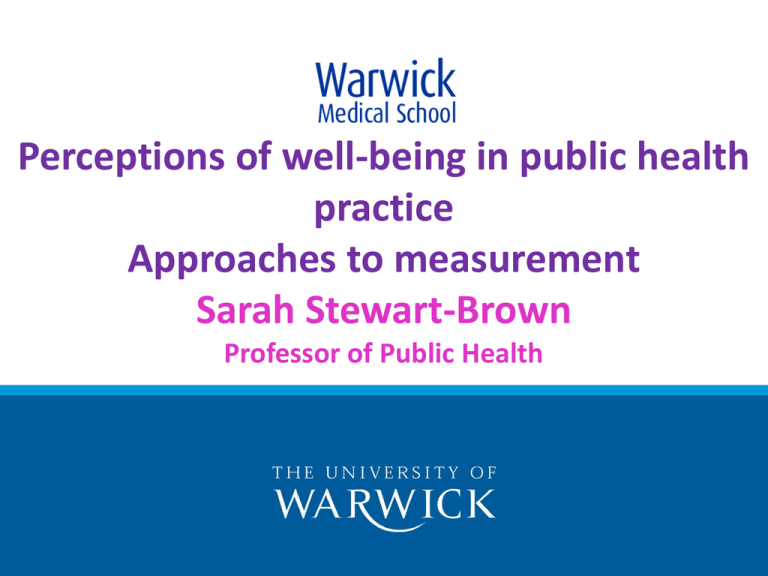
Perceptions of well-being in public health practice Approaches to measurement Sarah Stewart-Brown Professor of Public Health •Descartes was wrong •The mind and body are one Debate about the meaning of wellbeing focuses on mental wellbeing Healthy Lives Healthy People 2010 • Health and wellbeing • Physical health and mental health • Mental wellbeing – self-esteem – confidence – resilience Contributions • Philosophers – Western: Aristotle Epicurus – Eastern: Buddhism, Hindu, Islam • Psychologists – Psychological functioning, – Positive psychology – Flourishing Wellbeing is something that is cultivated by the individual Psychological Well-being (Eudaemonic) Functioning well /flourishing • • • • • • Autonomy Self acceptance Personal growth Purpose in life Environmental mastery Positive relations with others Ryff 1995 Jahoda 1958 Positive Mental Functioning • • • • • • Autonomy Environmental mastery Self actualisation Integration Attitudes towards self Perceptions of reality Ryan and Deci (2001) Basic Psychological Needs from Self Determination Theory • Autonomy –I have a say in what happens to me and can voice opinions • Competence –I feel very capable and effective • Relatedness –I feel loved and cared about Seligman (2002/2011) Authentic Happiness • Pleasure • Engagement • Meaning • Relationships • Accomplishment Contributions • Social Scientists Wellbeing is something that is determined by social conditions – GDP – Income, wealth, poverty – Government – Services • Education • Health • Social Subjective Wellbeing (Hedonic) feeling good/happiness/ affective well-being • Feeling good • Life satisfaction • Happiness Diener 1993 DEFRA, OECD Measures of wellbeing Poverty Educational failure Unemployment Homelessness Determinants of mental illness Both matter Internal states External conditions Both matter Functioning Feeling Diener 2010 • • • • • • • Purpose in life, Positive relationships, Engagement, Competence, Self-esteem, Optimism Contribution towards wellbeing of others Keyes 2002 Mental Health Continuum Canada Holland • Happiness • Psychological wellbeing (Ryff) • Social wellbeing – Social acceptance – Social actualisation – Social contribution – Social coherence – Social integration Huppert 2011 European Social Survey • • • • • • • Competence : Most days I feel a sense of accomplishment Emotional stability: In the past week I felt calm and peaceful Engagement: I love learning new things Meaning : I generally feel what I do is valuable and worthwhile Optimism: Positive emotion: how happy would you say you are ? Positive relationships – people in my life who really care about me • Resilience: when things go wrong takes a long time to get back to normal • Self esteem: I feel very positive about myself • Vitality In the past week I had a lot of energy to space New Economics Foundation • • • • • Emotional wellbeing Satisfaction with life Vitality Resilience and self esteem Positive Functioning Measurement in UK Office of National Statistics: Approach • Overall how satisfied are you with your life nowadays? • Overall how happy did you feel yesterday ? • Overall how anxious did you feel yesterday ? • Overall, to what extent do you feel things you do in your life are worthwhile ? The Warwick-Edinburgh Mental Well-being Scale (WEMWBS) STATEMENTS None of Rarely Some of Often All of the time the time the time I’ve been feeling optimistic about the future I’ve been feeling useful I’ve been feeling relaxed I’ve been feeling interested in other people I’ve had energy to spare I’ve been dealing with problems well 1 2 3 4 5 1 2 3 4 5 1 2 3 4 5 1 2 3 4 5 1 2 3 4 5 1 2 3 4 5 I’ve been thinking clearly I’ve been feeling good about myself 1 2 3 4 5 1 2 3 4 5 I’ve been feeling close to other people 1 2 3 4 5 I’ve been feeling confident I’ve been able to make up my own mind about things I’ve been feeling loved I’ve been interested in new things 1 2 3 4 5 1 2 3 4 5 1 2 3 4 5 1 2 3 4 5 I’ve been feeling cheerful 1 2 3 4 5 Issues • Single measure or multiple measures? • Positive or negative measures? • Proportion or mean score ? WEMWBS vs CESD-D Pearson correlation .842 WEMWBS cf PHQ-9 Pearson correlation .74 Positive or Negative • Great majority of measures of mental health focus on the negative/ disease / distress • Focusing on the positive is an intervention in its own right. – ‘What you pay attention to is what you get more of’ • Public and patients prefer positive measures Crawford et al. Selecting outcome measures in mental health. J. Mental Health 2011(20)336-346 Issues • Single measure or multiple measures? • Positive or negative measures? • Proportion or mean score ? WEMWBS vs CESD-D Pearson correlation .842 NHS Direct • http://www.nhs.uk/Livewell/mentalwellbeing/Pages/five-ways-mentalwellbeing.aspx • 5 Steps to Mental Wellbeing • Wellbeing self assessment Summing up • Perceptions of wellbeing derive from diverse disciplines • Opinions are converging • Currently available measures vary, but are good enough for: – Monitoring population wellbeing – Evaluating interventions – Studying determinants • We have focused for too long on the negative and therefore know more about the determinants of illness • Time to change



